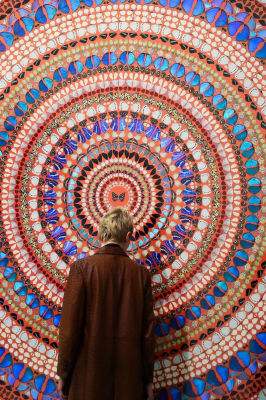Gospel in Art: Salute no one on the road

Man standing in front of Tranquility, by Damien Hirst. At White Cube Gallery 2019
Source: Christian Art
Gospel of 27 May 2022
Luke 10:1-9
The Lord appointed seventy-two others and sent them out ahead of him, in pairs, to all the towns and places he himself was to visit. He said to them, 'The harvest is rich but the labourers are few, so ask the Lord of the harvest to send labourers to his harvest. Start off now, but remember, I am sending you out like lambs among wolves. Carry no purse, no haversack, no sandals. Salute no one on the road. Whatever house you go into, let your first words be, "Peace to this house!" And if a man of peace lives there, your peace will go and rest on him; if not, it will come back to you. Stay in the same house, taking what food and drink they have to offer, for the labourer deserves his wages; do not move from house to house. Whenever you go into a town where they make you welcome, eat what is set before you. Cure those in it who are sick, and say, "The kingdom of God is very near to you."'
Reflection on the painting
In today's Gospel we read how Jesus sends out his disciples on mission. They are sent out to work, but not alone: they go in pairs, accompanied by a fellow companion and also by God, who is watching over them. A sense of urgency and focus is conveyed by Jesus' brief instruction, 'Salute no one on the road.' We are to be focussed when we want to help build the kingdom of God. The single-minded urgency of the Word of God requires the heart to be centred on our mission.
In the kaleidoscope of our lives, with its myriad of different colours and distractions, our hearts need to be focussed on Christ. The kaleidoscope was invented by Sir David Brewster in 1816. It is an optical device consisting of small mirrors that reflect images of small pieces of coloured glass in a symmetrical geometric design through a viewer. The optical design can be changed endlessly by rotating the section containing the loose fragments. The name is derived from the Greek words kilos ("beautiful"), eïdos ("form"), and skopeïn ("to view").
Our illustration, by Damien Hirst, shows a man standing in front of a canvas. The work consists of hundreds of butterfly wings laid down on household canvas. The symmetrical geometric design evokes that of a kaleidoscope. There is a clear centre or focus to the painting: a single butterfly. Everything that surrounds it is beautiful but yet distracting.
Whatever we are the most focused on in our lives, we will have the most faith in... we are asked for that to be Christ.
LINK
Christian Art: www.christian.art
Today's image: https://christian.art/daily-gospel-reading/luke-10-1-9-2022-2/




![Engraving by Lucas Cranach the Elder, From The Martyrdom of the Twelve Apostles [Holl. 53-64], © National Gallery of Art, Washington](https://cdn.indcatholicnews.com/articles/174717576698xBGJDXgWR7uKOpn0yf3QoY16sICb.png?width=330&aspect_ratio=3:2)













